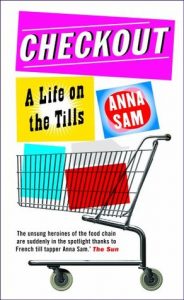 As a long-time reader of Not Always Right, including the sometime sister blog, now sub-category Not Always Working, the subject matter of Checkout is not new to me. In fact, although I have never worked the tills myself, I’ve briefly worked in customer service and also have sufficient empathy to realise that the person behind the till (the checkout girl, according to Anna Sam, hereabouts it’s just as frequently – I think, though I haven’t counted – a checkout boy) is a person, and that jokes such as «oh, if it has no price it must be free, right?» are not funny the one billionth time (if they ever were).
As a long-time reader of Not Always Right, including the sometime sister blog, now sub-category Not Always Working, the subject matter of Checkout is not new to me. In fact, although I have never worked the tills myself, I’ve briefly worked in customer service and also have sufficient empathy to realise that the person behind the till (the checkout girl, according to Anna Sam, hereabouts it’s just as frequently – I think, though I haven’t counted – a checkout boy) is a person, and that jokes such as «oh, if it has no price it must be free, right?» are not funny the one billionth time (if they ever were).
However, reading about clueless customers and hopeless coworkers is entertaining (you get the latter in all industries), and so I was rather looking forward to Checkout. But I must admit the book left me less than enthusiastic. I don’t know exactly what I’d expected, but I guess probably more actual anecdotes, something there is very little of. The book reads as a sort of (spoof) manual for wannabe checkout girls, explaining the various duties (counting your box at the end of the day) and challenges (finding a chair for your till; as management never replaces broken ones there is a shortage) you will encounter. Along the way there are customer stories, to be sure, but they are mostly anonymised to such an extent that they are left somewhat flat. I understand the need to anonymise, especially while you’re still employed as a checkout girl (and as far as I understand Sam first wrote a blog before being given a book contract), but it does spoil the impact, at least when it’s carried out to the degree it is here.
Another thing that bothered me, and it’s a niggling concern and probably a matter of personal taste, is that my English copy refers to British conditions whenever there are identifiable details such as currency and brands. As the book was first published in French (as Les tribulations d’une caissière) I am pretty sure that lines such as «According to the latest news the Bank of England has run out of small coins» (page 127) and «Yet again I ask for £1 and £2 coins» (page 171) did not refer to Bank of England and £ in the original. I may be unusually aware that I’m reading a translation (as I so seldom do, partly because I am so aware, it’s something of a Catch 22), but I am annoyed rather than helped by the translation of such details, and it breaks my reading flow.
In conclusion, I guess if you’re the sort of person who treats the cashier as a robot or your own personal servant, you might need to read this book, but I doubt you will. And in any case you – and the rest of us – would be better off reading Not Always Right, to be honest.
My copy will be bookcrossed. I guess I should leave it in a supermarket?